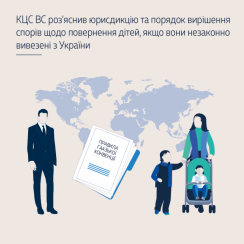Contact center of the Ukrainian Judiciary 044 207-35-46

The father asked the court to return the minor children, who had gone abroad with their mother to the Republic of Armenia, to their previous place of residence in Ukraine.
After the claim being rejected by the courts of first instance and the courts of appeal on various legal grounds, the Civil Cassation Court within the Supreme Court reversed the previous court decisions and remanded the case for a new hearing to the court of first instance, making such legal conclusions.
The district court had not taken into account the presence of a foreign element in the dispute, and when making the decision it applied solely national legislation. The court of appeal considered an effective remedy for the complainant to have recourse to the Central Authority of the State of habitual residence of the child or another Contracting State under the rules of articles 8 to 11 of the Convention on the Civil Aspects of International Child Abduction of October 25, 1980 (hereinafter referred to as the 1980 Hague Convention) and not to the courts.
The Supreme Court pointed out that, under the rules of the 1980 Hague Convention, the applicant had the right to apply to:
1) the Central Authority of the State (in Ukraine, the Ministry of Justice) of the child's habitual residence;
2) the Central Authority of the State (for example: in the Republic of Armenia - the Ministry of Justice, etc.) to which the child was taken and in which he/she is kept;
3) the court.
The 1980 Hague Convention does not in any way prevent the courts of Contracting States from considering a child abduction case without having recourse to the central authorities.
The fact that the applicant has already applied to the Central Authority of the State of probable residence of the children cannot be an obstacle to having recourse to the competent court.
At the same time, the courts of first and appeal instances did not resolve the primary issue, namely, whether this dispute was subject to consideration by the courts of Ukraine.
According to Art. 5 of the Convention on Jurisdiction, Applicable Law, Recognition, Enforcement and Co-operation in Respect of Parental Responsibility and Measures for the Protection of Children dated October 19, 1996 (hereinafter referred to as the 1996 Hague Convention), subject to Art. 7, in case of a change of the child's habitual residence to another Contracting State, the authorities of the State of the new habitual residence have jurisdiction.
The habitual residence of the child should be understood as a place whose existence proves a certain degree of attachment of the child to his social and family environment.
The plaintiff in such a category of cases, in bringing an action before a court, must prove that Ukraine, as a State, was the permanent and habitual place of residence of the children prior to their wrongful removal or retention in another Contracting State.
The courts of first and appeal instances did not examine the issue of establishing the habitual place of residence of the applicant's children in Ukraine prior to their illegal removal /retention in another state.
In this category of cases, the jurisdiction to resolve the dispute is fixed in the place of the child's permanent residence, and therefore, if the place of the child's permanent residence is transferred to another State, the authorities of the State of the new place of permanent residence acquire jurisdiction over the merits of the dispute. At the same time, the courts of first and appeal instances did not examine the question of whether the children settled down in their new place of residence.
The Supreme Court pointed out that in order to decide whether such a case is subject to consideration by the courts of Ukraine, it is necessary to find out:
Depending on whether the dispute is to be resolved by the courts of Ukraine, the courts will have either to resolve the dispute on the merits or to close the proceedings because the dispute is not subject to consideration by the courts of Ukraine.
Since the case requires the collection and additional verification and evaluation of evidence, the facts of the case were not fully established by the courts, the provisions of procedural law on the jurisdiction of the dispute were improperly applied, and the establishment of such significant violations of the provisions of procedural law and the incorrect application of the provisions of substantive law deprive the Supreme Court of the opportunity to make a new decision in the case.
Resolution of the Supreme Court of August 17, 2022, in case No. 613/1185/19 (proceedings No. 61-2286св21) – https://reyestr.court.gov.ua/Review/106204815.
This and other legal positions of the Supreme Court can be found in the Database of Legal Positions of the Supreme Court - lpd.court.gov.ua/login.